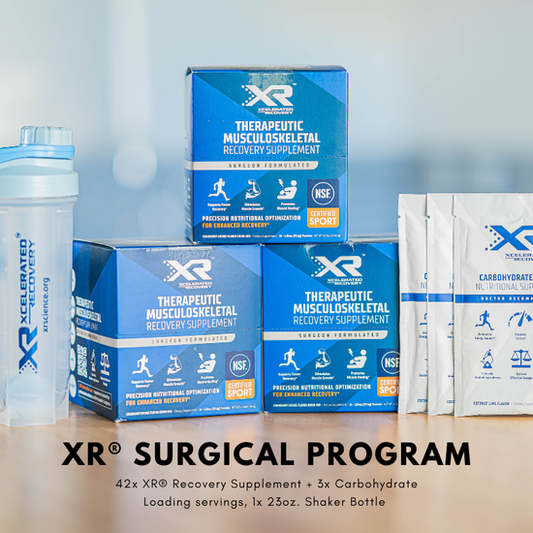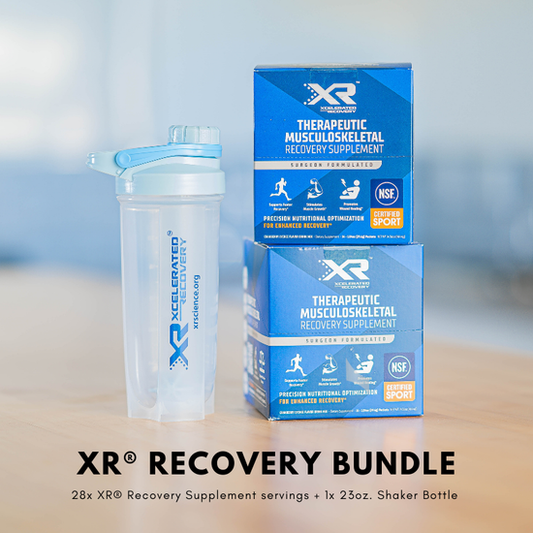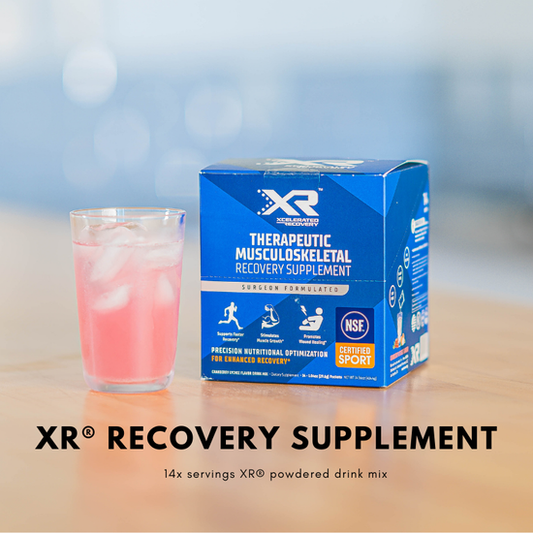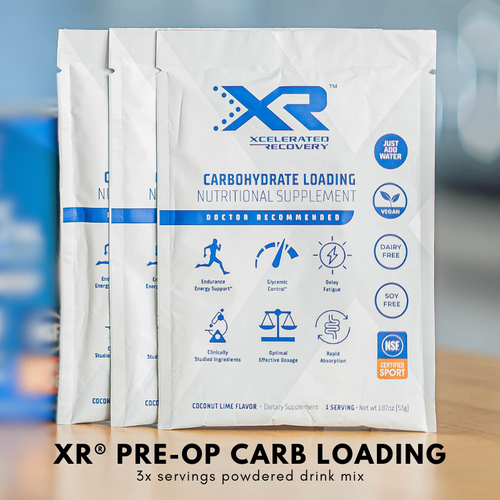
Fueling Your Healing: Nutrition's Role in Optimizing Total Knee Replacement Surgery Recovery
Share
Author: Dr. Reza Jazayeri and Dr. Joseph Zuckerman
Each year, over 700,000 total knee replacements (TKR) are performed in the United States alone. The procedure is most commonly performed on individuals over the age of 60, which is also the age group where there is a decline in both muscle mass and nutritional status.
Knee osteoarthritis (OA) is a chronic musculoskeletal condition that leads to decreased function and muscle loss, particularly in the quadriceps muscles, which can greatly affect walking ability. TKR can greatly improve quality of life for patients with knee pain and disability, but it also has challenges and potential complications such as muscle loss or atrophy due to surgery, disuse, and inactivity. The invasiveness of the surgery exacerbates muscle loss, increasing risk of complications such as dislocation, instability, prolonging recovery and rehabilitation time. Additionally, muscle loss can negatively impact overall strength, making it difficult to perform daily activities and return to normal function.
According to a systematic review of studies published in the Journal of Orthopaedic Research, muscle loss after total knee replacement ranges from 15-40% in the quadriceps and hamstrings muscles. Furthermore, This deterioration of skeletal muscle is even more pronounced in older patients, with a study by Dreyer et al. (2013) estimating that atrophy in patients over 65 years of age recovering total knee arthroplasty occurred at around 1% per day.
To minimize muscle loss during recovery, it is essential for patients to work closely with their healthcare team to develop an individualized rehabilitation plan that focuses on maintaining and improving muscle strength. Prehabilitation, also known as prehab therapy, is a concept that has gained traction in recent years and refers to the process of preparing for surgery by engaging in physical and nutritional therapy prior to the procedure. This strategy is quickly becoming the standard for elective orthopedic surgeries. The goal of prehabilitation is to enhance a patient's physical condition and overall well-being prior to surgery, resulting in improved outcomes and a quicker recovery.
Nutritional status has been identified to be a strong predictor of surgical outcomes in orthopaedic trauma, total joint arthroplasty, spine as well rotator cuff repair literature. Studies have demonstrated an increase in complications, including infection, increased length of stay, impaired wound healing and increased cost utilization in patients with poor nutritional status.
Recent research has highlighted the importance of a patient's nutritional status in predicting the outcome of total knee replacement. A study by Hams et al. (2013) found that malnourished patients had a higher risk of infection, longer hospital stays, and delayed wound healing. Additionally, a study by Dreyer et al. (2020) found that preoperative protein deficiency was associated with increased risk of postoperative complications and prolonged hospital stay in healthy patients. The surgical stress cascade, which includes changes in metabolism, immune function, and nutrient utilization, can greatly impact the recovery process even in healthy patients undergoing TKR.
This age group is particularly vulnerable to the surgical cascade, as Hirsch et al. (2021) have described as a “cascade of inflammatory, immune, and metabolic responses that result in a hypermetabolic-catabolic state”. This state increases the demand for amino acids, leading the body to break down skeletal muscle, which serves as a reservoir for amino acids, in order to meet energy demands and promote wound healing. However, this muscle breakdown leads to muscle atrophy, which is further exacerbated by the limited activity and immobility during the healing process. This compounds the underlying chronic muscle loss and presents a significant barrier to recovery.
Decreased leg muscle strength is a factor for falling and fractures, and is a major factor determining whether elderly patients can independently perform living functions, and knee extension strength is particularly important for walking. Previous studies have also indicated that patients who undergo TKA have a 20% to 30% reduction in muscle strength and walking ability, even at 1 year after the surgery, compared with same age controls (6). Muscle strength and daily living activity level are closely related. Mitigating loss of quadriceps strength that occurs after surgery has the potential to lead to improved walking ability, contribute to the prevention of falls, can lead to improved outcomes and a faster return to normal activities and improved quality of life. It's important to take into account that as people age, their nutritional status tends to decline, hence the importance of adequate nutrition before and after surgery which may aid in enhancing the recovery process.
Nutritional Strategies for Enhancing Surgical Outcomes:
Providing proper pre- and post-operative nutrition can help to preserve muscle mass, strength, and functionality, which are critical for recovery following knee replacement. A study by Hirsch et al. in Nutrients, "Pre- and post-surgical nutrition for preservation of muscle mass, strength, and functionality following orthopedic surgery" highlights the importance of providing adequate nutrition to patients before and after surgery.
In addition, supplements that increase muscle protein synthesis can be beneficial during the perioperative period, when patients are experiencing increased metabolic stress and higher protein needs due to invasive surgery.
The following studies highlight the benefits of nutritional supplementation for individuals undergoing total knee replacements:
- Nishizaki et al. (2015) found that supplementation with a combination of β-hydroxy-β-methyl butyrate, L-arginine, and L-glutamine improved postoperative recovery of quadriceps muscle strength after total knee arthroplasty. The study involved 60 patients who were randomly assigned to receive the supplement or a placebo. The results showed that the supplement group had significantly greater improvement in quadriceps muscle strength as well as increased quadriceps muscle volume compared to the placebo group.
- Hans C. Dreyer et al. (2019) in the Journal of Bone and Joint Surgery found that essential amino acid supplementation mitigates muscle atrophy after total knee arthroplasty. The study involved 60 patients who were randomly assigned to receive the supplement or a placebo. The results showed that the supplement group had significantly greater improvement in muscle mass and muscle strength compared to the placebo group.
- Hans C. Dreyer et al. (2013) in The Journal of Clinical Investigation supports the use of nutritional supplementation in total knee replacement. The study found that essential amino acid supplementation in patients following total knee arthroplasty can prevent muscle wasting, improve muscle function and reduce inflammation.
- Ueyama et al. (2020) also supports the use of nutritional supplementation in total knee replacement. The study, winner of the 2020 Chitranjan S. Ranawat Award, found that perioperative essential amino acid supplementation suppressed rectus femoris muscle atrophy and accelerated early functional recovery following total knee arthroplasty. The study was a prospective double-blind randomized controlled trial, involving 60 patients.
In summary, total knee replacement is a common procedure for treating osteoarthritis and minimizing muscle loss during recovery is crucial for patients' overall health and well-being. Prehabilitation, or prehab therapy, is an effective strategy that involves engaging in physical and nutritional therapy prior to surgery and has become the standard for elective orthopedic surgeries. Nutritional supplementation, including specific combinations of β-hydroxy-β-methyl butyrate, L-arginine, L-glutamine, and essential amino acids, can also improve postoperative recovery, prevent muscle wasting, reduce inflammation, and accelerate functional recovery after total knee replacement. It is essential for patients to work closely with their healthcare team to develop an individualized rehabilitation plan that focuses on maintaining and improving muscle strength and consider prehabilitation and nutritional supplementation as important strategies to optimize recovery outcomes.
References:
- "Muscle atrophy after total knee arthroplasty: a systematic review." J Orthop Res. 2014 Jul;32(7):937-44
- Nishizaki, K. et al. "Effects of supplementation with a combination of β-hydroxy-β-methyl butyrate, L-arginine, and L-glutamine on postoperative recovery of quadriceps muscle strength after total knee arthroplasty." Journal of Orthopaedic Surgery and Research (2018) 13:39
- Dreyer, H.C.; Strycker, L.A.; Senesac, H.A.; Hocker, A.D.; Smolkowski, K.; Shah, S.N.; Jewett, B.A. Essential amino acid supplementation in patients following total knee arthroplasty. J. Clin. Invest. 2013, 123, 4654–4666.
- Dreyer, H.C.; Owen, E.C.; Strycker, L.A.; Smolkowski, K.; Muyskens, J.B.; Kirkpatrick, T.K.; Christie, A.D.; Kuehl, K.S.; Lantz, B.A.; Shah, S.N.; et al. Essential Amino Acid Supplementation Mitigates Muscle Atrophy After Total Knee Arthroplasty: A Randomized, Double-Blind, Placebo-Controlled Trial. JBJS 2019
- Ueyama,H, N. Kanemoto,Y. Minoda,Y. Taniguchi,H. Nakamura 2020 Chitranjan S. Ranawat Award:Perioperative essential amino acid supplementation suppresses rectus femoris muscle atrophy and accelerates early functional recovery following total knee arthroplasty A prospective double-blind randomized controlled trial 2020 Bone Joint J
- Hiroo M, Koji S, Syunji K. The knee muscle strength and physical functions after total knee arthroplasty. Kurume Med J. 2012;75:391-7.
- Hirsch KR, Wolfe RR, Ferrando AA. "Pre- and post-surgical nutrition for preservation of muscle mass, strength, and functionality following orthopedic surgery." Nutrients. 2021;13(5):1675.








